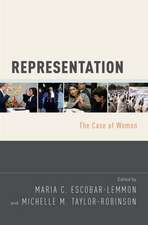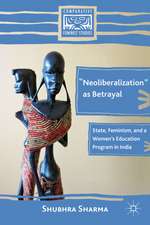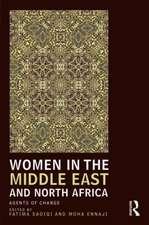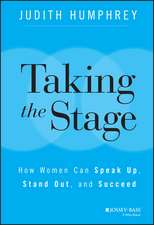Women’s Movements in Post-“Arab Spring” North Africa: Comparative Feminist Studies
Editat de Fatima Sadiqien Limba Engleză Hardback – 24 mai 2016
Din seria Comparative Feminist Studies
-
 Preț: 299.34 lei
Preț: 299.34 lei -
 Preț: 302.20 lei
Preț: 302.20 lei - 18%
 Preț: 893.21 lei
Preț: 893.21 lei -
 Preț: 390.84 lei
Preț: 390.84 lei -
 Preț: 392.37 lei
Preț: 392.37 lei -
 Preț: 386.81 lei
Preț: 386.81 lei -
 Preț: 387.38 lei
Preț: 387.38 lei -
 Preț: 383.93 lei
Preț: 383.93 lei - 18%
 Preț: 949.23 lei
Preț: 949.23 lei -
 Preț: 387.38 lei
Preț: 387.38 lei -
 Preț: 388.72 lei
Preț: 388.72 lei -
 Preț: 387.75 lei
Preț: 387.75 lei -
 Preț: 389.70 lei
Preț: 389.70 lei -
 Preț: 385.62 lei
Preț: 385.62 lei -
 Preț: 386.81 lei
Preț: 386.81 lei -
 Preț: 389.70 lei
Preț: 389.70 lei -
 Preț: 388.72 lei
Preț: 388.72 lei -
 Preț: 387.75 lei
Preț: 387.75 lei -
 Preț: 383.93 lei
Preț: 383.93 lei - 15%
 Preț: 696.82 lei
Preț: 696.82 lei - 15%
 Preț: 583.61 lei
Preț: 583.61 lei -
 Preț: 386.99 lei
Preț: 386.99 lei -
 Preț: 388.72 lei
Preț: 388.72 lei -
 Preț: 386.81 lei
Preț: 386.81 lei -
 Preț: 385.62 lei
Preț: 385.62 lei
Preț: 734.90 lei
Preț vechi: 896.22 lei
-18% Nou
Puncte Express: 1102
Preț estimativ în valută:
140.64€ • 145.94$ • 117.55£
140.64€ • 145.94$ • 117.55£
Carte tipărită la comandă
Livrare economică 17-31 martie
Preluare comenzi: 021 569.72.76
Specificații
ISBN-13: 9781137520470
ISBN-10: 1137520477
Pagini: 314
Ilustrații: XII, 325 p.
Dimensiuni: 155 x 235 x 24 mm
Greutate: 0.65 kg
Ediția:1st ed. 2016
Editura: Palgrave Macmillan US
Colecția Palgrave Macmillan
Seria Comparative Feminist Studies
Locul publicării:New York, United States
ISBN-10: 1137520477
Pagini: 314
Ilustrații: XII, 325 p.
Dimensiuni: 155 x 235 x 24 mm
Greutate: 0.65 kg
Ediția:1st ed. 2016
Editura: Palgrave Macmillan US
Colecția Palgrave Macmillan
Seria Comparative Feminist Studies
Locul publicării:New York, United States
Cuprins
Series Editor's Preface; Chandra Talpade Mohanty
Introduction: The Centrality of Women's Movements in the Post-Revolution Dynamics
in North Africa; Fatima Sadiqi
PART I: CONTEXTUALIZING WOMEN'S MOVEMENTS IN NORTH AFRICA: CONCEPTUAL ISSUES
1. The Center: A Post-Revolution Space for Women's Movements in North Africa. Morocco as an Example; Fatima Sadiqi
2. Women and the Arab Spring: A Transnational, Feminist Revolution; miriam cooke
3. Creative Disobedience: Feminism, Islam, and Revolution in Egypt; Margot Badran
4. Gendering the Egyptian Revolution; Dina Wahba
5. The Lipstick on the Edge of the Well: Mauritanian Women and Political Power (1960 2014); Céline Lesourd
PART II: SPECIFIC COUNTRY EXPERIENCES
6. About North African Women's Rights After the Arab Spring; Moha Ennaji
7. Women's Rights and Equality: Egyptian Constitutional Law; Ellen McLearney
8. The Struggle of Egyptian Women for Equal Rights Continues: Two-Steps Forward, One-Step Backward; Moushira Khattab
9. Women, Art, and Revolution in the Streets of Egypt; Nevine El Nossery
10. Notes on Sudanese Women's Activism, Movements, and Leadership; Sondra Hale
11. Revolutionary Nuns or Totalitarian Pawns: Evaluating Libyan State Feminism After Mu'ammar al-Gaddafi; Amanda Rogers
12. Tunisian Women's Literature and the Critique of Authority: Sources, Contexts, and the Tunisian 'Arab Spring"; Lilia Labidi
13. Engendering Tunisia's DemocraticTransition: What Challenges Are Facing Women?; Nabila Hamza
14. Women and Leadership in the Post-Arab Spring: The Case of Tunisia; Khadija Arfaoui
15. The Algerian Woman Issue: Struggles, Islamic Violence, and Cooptation; Rachid Tlemçani
16. Moroccan Women in Limbo: On Liminal Citizenship and the Quest for Equality; Soumia Boutkhil
17. Moroccan Women's Cultural Rights: A Psycho-Social Perspective on Cultural Paradoxes; Rachida Kerkech
18. Women's Economic Empowerment in Morocco: The Case of Social Entrepreneurship; Manal Elattir, Yamina El Kirat El Allame, and Youness Tihm
19. Reflections on the 20-February Movement: Hope Renewed, Hope Frustrated for Women; Abdellatif Zaki
Introduction: The Centrality of Women's Movements in the Post-Revolution Dynamics
in North Africa; Fatima Sadiqi
PART I: CONTEXTUALIZING WOMEN'S MOVEMENTS IN NORTH AFRICA: CONCEPTUAL ISSUES
1. The Center: A Post-Revolution Space for Women's Movements in North Africa. Morocco as an Example; Fatima Sadiqi
2. Women and the Arab Spring: A Transnational, Feminist Revolution; miriam cooke
3. Creative Disobedience: Feminism, Islam, and Revolution in Egypt; Margot Badran
4. Gendering the Egyptian Revolution; Dina Wahba
5. The Lipstick on the Edge of the Well: Mauritanian Women and Political Power (1960 2014); Céline Lesourd
PART II: SPECIFIC COUNTRY EXPERIENCES
6. About North African Women's Rights After the Arab Spring; Moha Ennaji
7. Women's Rights and Equality: Egyptian Constitutional Law; Ellen McLearney
8. The Struggle of Egyptian Women for Equal Rights Continues: Two-Steps Forward, One-Step Backward; Moushira Khattab
9. Women, Art, and Revolution in the Streets of Egypt; Nevine El Nossery
10. Notes on Sudanese Women's Activism, Movements, and Leadership; Sondra Hale
11. Revolutionary Nuns or Totalitarian Pawns: Evaluating Libyan State Feminism After Mu'ammar al-Gaddafi; Amanda Rogers
12. Tunisian Women's Literature and the Critique of Authority: Sources, Contexts, and the Tunisian 'Arab Spring"; Lilia Labidi
13. Engendering Tunisia's DemocraticTransition: What Challenges Are Facing Women?; Nabila Hamza
14. Women and Leadership in the Post-Arab Spring: The Case of Tunisia; Khadija Arfaoui
15. The Algerian Woman Issue: Struggles, Islamic Violence, and Cooptation; Rachid Tlemçani
16. Moroccan Women in Limbo: On Liminal Citizenship and the Quest for Equality; Soumia Boutkhil
17. Moroccan Women's Cultural Rights: A Psycho-Social Perspective on Cultural Paradoxes; Rachida Kerkech
18. Women's Economic Empowerment in Morocco: The Case of Social Entrepreneurship; Manal Elattir, Yamina El Kirat El Allame, and Youness Tihm
19. Reflections on the 20-February Movement: Hope Renewed, Hope Frustrated for Women; Abdellatif Zaki
Recenzii
"This volume is a must read for anyone in search of a greater understanding of gender issues in North Africa since the Arab uprisings. It offers a theoretically nuanced and highly informative study of how women's movements operate in countries as diverse as Algeria, Egypt, Libya, Mauritania, Morocco, Tunisia and Sudan. Combining academic and activist perspectives, and highlighting the variety of women's experiences, the authors present rich evidence and incisive analyses. The volume makes a unique contribution to the scholarly literature on women's movements in the region." - Mounira M. Charrad, Professor of Sociology, University of Texas at Austin, USA, and author of the award-winning book, States and Women's Rights: The Making of Postcolonial Tunisia, Algeria and Morocco
"This collection provides exciting and important discussions of the women's rights movements in the Middle East and North Africa, spanning multiple national, historical, political, and social contexts. The comparative perspective is useful and timely, specifically underscoring the varying and multiple contexts that defy any facile or homogenous approach to studying feminist movements in the Middle East and North Africa." - Carol Fadda-Conrey, Associate Professor of English, Syracuse University, USA
"This collection provides exciting and important discussions of the women's rights movements in the Middle East and North Africa, spanning multiple national, historical, political, and social contexts. The comparative perspective is useful and timely, specifically underscoring the varying and multiple contexts that defy any facile or homogenous approach to studying feminist movements in the Middle East and North Africa." - Carol Fadda-Conrey, Associate Professor of English, Syracuse University, USA
Notă biografică
Fatima Sadiqi is Professor of Linguistics and Gender Studies at the University of Fez, Morocco. Her work focuses on women's issues in modern North Africa, the Middle East, and the Mediterranean world. She is author and editor of numerous volumes and journal issues, including Women, Gender and Language, Women and Knowledge in the Mediterranean, and Moroccan Feminist Discourses .
Textul de pe ultima copertă
Unexpected and transformative revolutions broke off in North Africa and quickly spread to the Middle East and the rest of the world in 2010 and 2011. Spontaneous, leaderless, youth-driven, and backed by social media, these revolutions called for karamah (dignity) and democracy. Centering on women's movements before, during, and after the revolutions, Women's Movements in Post-"Arab Spring" North Africa highlights the broader sources of authority that affected the emergence of new feminist actors and agents and their impact on the sociopolitical landscapes of the region. Until recently, studies of North African women's movements have focused on aspects of women's achievements one at a time. By providing a comparative analysis, this book is the first to shed light not only on the role that these superstructures play in shaping women's experiences in North Africa, but also on the rich variety of women's responses to authority and their potential contributions to African and global feminist thought. From the pre-history of the revolutions to their aftermath, the far-reaching historical and national scope of this collection expands the study of women's movements in North Africa beyond national borders, while still paying close attention to local characteristics.


















